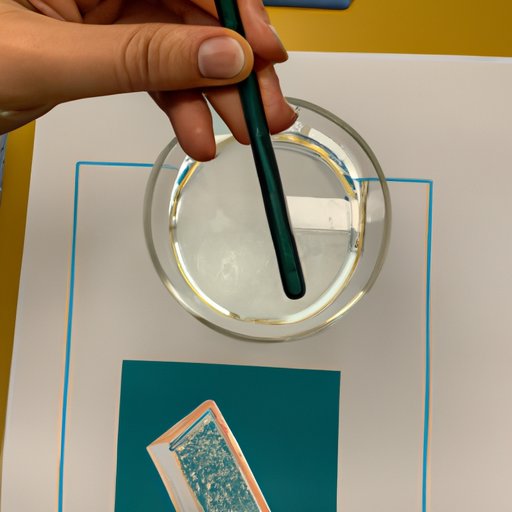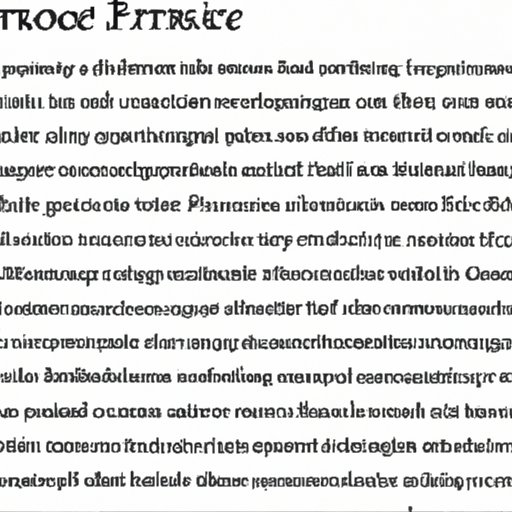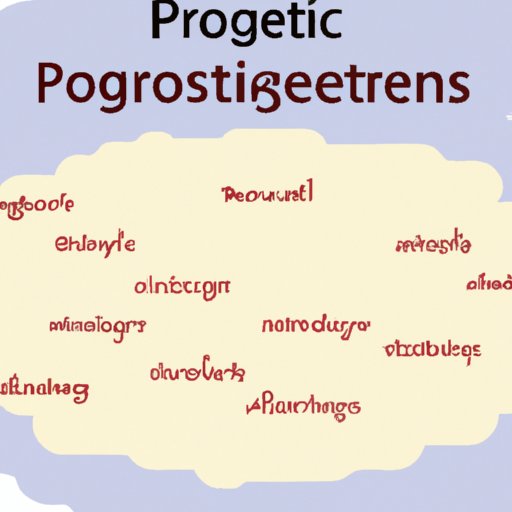Introduction
An abstract is a summary of a scientific paper, thesis, or project that provides readers with a quick overview of the entire document. It is typically used to give readers a better understanding of the research that has been conducted and the results that have been achieved without having to read the entire paper. Abstracts for science projects are often required for submissions to science fairs and other competitions, so it’s important to understand what makes a good one.

Exploring the Basics of an Abstract for a Science Project
In order to write an effective abstract for your science project, you should first understand what an abstract is and the elements it should include.
What is an Abstract?
An abstract is a brief summary of a larger document, such as a research paper, thesis, or project. It is usually no longer than 250 words and is designed to provide readers with a quick overview of the main points of the document. According to Dr. Kenneth Beare, an English as a Second Language (ESL) teacher, “The purpose of an abstract is to summarize the major aspects of a lengthy writing project or study in such a way that readers can quickly become acquainted with the main points and conclusions without having to read all of the supporting details.”
Understanding the Elements of an Abstract
An abstract should include the following elements: a description of the problem being studied, the methodology used to address the problem, the results of the study, and the conclusions drawn from the results. Additionally, an abstract should be written in a clear and concise manner, using active voice and avoiding unnecessary jargon.

Writing a Clear and Concise Abstract for a Science Project
When writing an abstract for a science project, it’s important to identify the relevant information and choose appropriate language.
Identifying the Relevant Information
Before writing an abstract for a science project, you should identify the relevant information that needs to be included. This includes the problem being studied, the methodology used to address the problem, the results of the study, and the conclusions drawn from the results.
Choosing Appropriate Language
Once you’ve identified the relevant information, you should use clear and concise language when writing your abstract. According to the Purdue University Online Writing Lab, “Use active voice and avoid overly technical language. Write for a general audience and focus on the significance of your research instead of the details.”
Structuring Your Abstract
It’s also important to structure your abstract in a way that makes it easy to read and understand. The abstract should begin with an introduction that describes the problem being studied and ends with a conclusion that summarizes the main points of the paper. In between these two sections, you should include the methodology used to address the problem, the results of the study, and the conclusions drawn from the results.

Crafting an Impressive Science Project Abstract
In order to make your abstract stand out, you should focus on creating an impactful title, showcasing your results, and focusing on the significance of your research.
Creating an Impactful Title
The title of your abstract should be catchy and memorable. It should clearly describe the topic of your research and be written in a way that will grab the reader’s attention. For example, instead of writing “The Effects of Light Intensity on Plant Growth,” you could write “Uncovering the Secrets of Photosynthesis: How Light Intensity Affects Plant Growth.”
Showcasing Your Results
When writing your abstract, you should also focus on highlighting the results of your research. You should briefly explain the results and emphasize the significance of your findings. This will help readers understand the importance of your research and why they should read the full paper.
Focusing on the Significance of Your Research
Finally, you should focus on the significance of your research. Explain how your research contributes to the field and why it is important. This will make your abstract more engaging and help convince readers to read the full paper.
The Key Elements of a Science Project Abstract
In order to write an effective abstract for your science project, you should include the following elements: objectives, methodology, results, and conclusions.
Objectives
The objectives section should explain the goals of the research and why it was conducted. It should provide readers with an understanding of the purpose of the research and what the researcher hoped to achieve.
Methodology
The methodology section should explain the methods used to conduct the research and any materials or equipment needed. This section should also include any procedures followed during the research process.
Results
The results section should provide a summary of the data collected during the research process and any conclusions drawn from the data. It should also explain any implications the results may have for the field of study.
Conclusions
The conclusions section should explain the significance of the results and provide readers with an understanding of the implications of the research. It should also provide recommendations for further research.
How to Write an Effective Abstract for Your Science Project
In addition to understanding the key elements of an abstract for a science project, there are several steps you can take to ensure your abstract is effective.
Organizing Your Ideas
Before writing your abstract, it’s important to organize your ideas. Make sure you have a clear understanding of the problem being studied, the methods used to address the problem, and the results of the study. This will help you write a clear and concise abstract.
Paying Attention to Detail
When writing your abstract, be sure to pay close attention to detail. Make sure all of the information is accurate and that the language is clear and concise. Avoid using unnecessary jargon and make sure the abstract is easy to read and understand.
Making Sure Your Abstract is Accurate
Finally, make sure your abstract is accurate. Read it over several times to make sure there are no errors or inaccuracies. If possible, have someone else read it over to catch any mistakes you may have missed.
Tips for Creating an Engaging Abstract for a Science Project
In addition to understanding the basics of writing an abstract for a science project, there are several tips you can follow to ensure your abstract is engaging.
Keeping It Short and Simple
When writing your abstract, it’s important to keep it short and simple. Keep your sentences concise and avoid going into too much detail. Aim for approximately 250 words and focus on the most important points of your research.
Using Active Voice
You should also use active voice when writing your abstract. According to the University of Wisconsin-Madison Writing Center, “Active voice is more direct and engaging, and it can help make your meaning clear to readers.”
Avoiding Unnecessary Jargon
Finally, you should avoid using unnecessary jargon. Stick to simple language and focus on explaining the main points of your research. This will make your abstract easier to read and understand.
Conclusion
An abstract for a science project is a brief summary of the research that has been conducted and the results that have been achieved. It should include the problem being studied, the methodology used to address the problem, the results of the study, and the conclusions drawn from the results. When writing your abstract, it’s important to identify the relevant information, choose appropriate language, structure your abstract, create an impactful title, showcase your results, and focus on the significance of your research. Additionally, there are several tips you can follow to ensure your abstract is engaging, such as keeping it short and simple, using active voice, and avoiding unnecessary jargon.
(Note: Is this article not meeting your expectations? Do you have knowledge or insights to share? Unlock new opportunities and expand your reach by joining our authors team. Click Registration to join us and share your expertise with our readers.)
